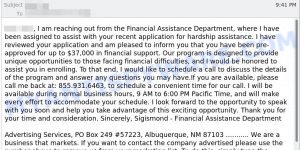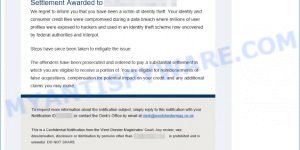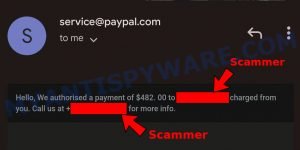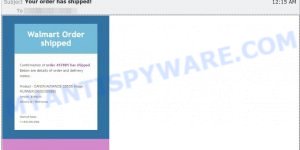The Student Loan Department email scam is a deceptive message sent by scammers to unsuspecting individuals, targeting those with student loans. The email typically contains false information about a program extension and urges recipients to contact them immediately to take advantage of supposed benefits before they expire. However, this is a ploy to trick recipients into revealing personal information or falling victim to a financial scam.

Quick Links:
- What is the Student Loan Department Email Scam?
- How the Scam Works
- Tips to Identify Email Scams
- What to Do if You Receive the Student Loan Department Scam Email
What is the Student Loan Department Email Scam?
The Student Loan Department email scam is a deceptive phishing strategy used by cybercriminals to trick victims into revealing their personal information or making unneeded payments. Scammers send an email posing as a representative from the Student Loan Department, with the aim of duping the recipient into believing they need to act urgently to take advantage of certain benefits or avoid severe consequences.
A typical “Financial Assistance Department” scam email reads as follows:
Hawi Ejigu, Hey this is the Student Loan Department... I’m reaching out to you regarding the recent program extension that has been issued in 2023. It’s important you get back to me as soon as possible to take full advantage of these benefits before they expire. Your case number is 35849, and you can reach us directly at: 833.617.2581, Thank you, Alleen CisnerosAdvertising Services, PO Box 249 #57223, Albuquerque, NM 87103 ......... We are a business that markets. To contact us you can contact us at the phone number above
The scam email typically contains the following deceptive elements:
- The email is personalized with the recipient’s name to create a false sense of legitimacy.
- The sender claims to be from the “Student Loan Department,” attempting to gain trust and appear authentic.
- A program extension is mentioned, along with the urgency to act quickly before the benefits expire.
- A case number (e.g., 35849) is provided to add a semblance of legitimacy to the email.
- Contact information, including a phone number (833.617.2581), is given to establish direct communication with the scammers.
- The email may include a signature, such as “Alleen Cisneros,” to make it appear more official.
How the Scam Works
The Student Loan Department email scam works by employing social engineering techniques to exploit individuals’ fears and concerns about their student loans. Scammers craft a convincing email that seems to come from a legitimate source, such as a government agency or student loan servicer. The email often includes official-sounding language and case numbers to create a sense of authenticity.
Recipients are urged to respond urgently to take advantage of supposed benefits or avoid negative consequences related to their student loans. However, if recipients respond or call the provided phone number, they may be directed to provide personal information, such as Social Security numbers, bank account details, or credit card information. This sensitive data is then used for identity theft, financial fraud, or other illicit activities.
What to Do if You Receive the Student Loan Department Scam Email
If you receive the Student Loan Department email scam or any similar fraudulent communications, take the following steps:
- Do Not Respond: Avoid replying to the email or calling the provided phone number. Responding may confirm to scammers that your email address is active.
- Report the Email: Forward the suspicious email to your email provider’s abuse or spam reporting address. Most email services have mechanisms to identify and block such scams.
- Delete the Email: Remove the email from your inbox and delete it immediately to prevent accidental interaction with the scammers.
- Stay Informed: Stay updated on common email scams and online fraud techniques to protect yourself from future attempts.
Examples of such scams
Unfortunately, the Student Loan Department Scam is just one of many similar types of scams that cybercriminals use to steal personal and financial information from unsuspecting victims. These types of scams often rely on social engineering tactics, such as urgency or fear, to trick victims into divulging sensitive information. Here are some other examples of scams that operate in a similar manner: Financial Assistance Department Scam Email, Cash Settlement Awarded Email Scam, and Geek Squad Email Scam.
- Financial Assistance Department Email Scam
- Avira Assistance PayPal Scam Invoice Email
- Cash Settlement Awarded Email Scam
- BNC Billing Canceled Invoice PayPal Email Scam
- Walmart Order Shipped Email Scam
Summary Table for the Student Loan Department Email Scam
| Name | Student Loan Department Email Scam |
|---|---|
| Type | Phishing Scam |
| Damage | Potential financial loss and identity theft |
| Distribution | Emails impersonating the Student Loan Department |
| Tactics | Scare tactics, urgent requests, and seemingly legitimate correspondence |
| Scammers’ Phone Numbers | 833-617-2581 |
| Prevention Tips | Be wary of unsolicited emails, verify contact details independently, never share personal info via email |
| Reporting Info | Report to local law enforcement, email service provider, and FTC at www.ftc.gov |
Tips to Identify Email Scams
To avoid falling victim to email scams like the Student Loan Department scam, keep the following tips in mind:
- Verify the Sender: Check the sender’s email address for legitimacy. Scammers often use email addresses that imitate official organizations but contain subtle misspellings or variations.
- Look for Grammar and Spelling Errors: Scam emails often contain grammatical mistakes and spelling errors, which are uncommon in official communications from legitimate organizations.
- Question Urgency: Be cautious of emails that create a sense of urgency or pressure you to act quickly. Scammers use urgency to prevent recipients from taking the time to verify the email’s authenticity.
- Contact Official Sources: If you receive an email claiming to be from a legitimate organization, verify the information by contacting the organization directly through official channels, such as their official website or customer service phone number.
- Do Not Provide Personal Information: Never share sensitive personal information or financial details in response to unsolicited emails or phone calls.
Conclusion
The Student Loan Department email scam is a deceptive attempt to exploit individuals with student loans. By being aware of the red flags and following the provided tips, you can protect yourself from falling victim to such fraudulent email communications.





















